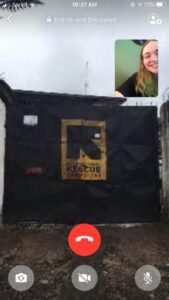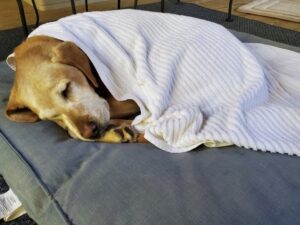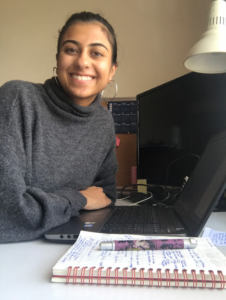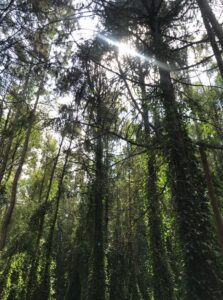November/December 2020
Dear Friends,
As with so many of you, 2020 has been a year of large challenges, adjustments and silver linings at Princeton in Africa. The 2020-21 Fellows all accepted the challenge of supporting their host organizations remotely. We have moved key elements of our programming, like orientation and interviews, to virtual platforms. Above all, we have been overwhelmed by the ways that our friends and alumni came together in support PiAf, the Fellows and each other.
As a thank you to our friends and supporters we are sharing a Virtual Indaba Series featuring members of our community discussing the challenges and innovation seen across Africa during COVID-19. In the 2nd installment of the series, Dedo Baranshamaje, creator and director of the Segal Family Foundation’s Social Impact Incubator, shares stories of innovation and entrepreneurship in East Africa in response to the challenges of COVID-19.
If you have not yet supported our work this year, please consider making a donation now. Donations received prior to December 20th will be DOUBLED by a family foundation in Pittsburg. Click here to help us maximize the impact of this end-of-year challenge.
Again, thank you for all the types of support you have shown our community during this challenging year. Wishing each of you a joyful holiday season and a very Happy New Year!
All the best,
Jodi & the PiAf Staff
PiAf Connections
Please click below to check out pictures of our Fellows, Alums and other members of the PiAf family meeting up at home and around Africa.
Notes from the Field
By Emily Mudd, '20-'21 Fellow with International Rescue Committee in Sierra Leone

IRC Sierra Leone colleagues take Emily on a virtual tour of the Freetown office.
Hello everyone, from what is somehow already three months into my new position as a Grants Fellow with the International Rescue Committee (IRC) in Sierra Leone! Despite my fears of starting a new position remotely, from my childhood bedroom no less, these past three months have been full of immense personal growth and new challenges.
IRC is an international humanitarian organization dedicated to supporting displaced communities around the world; from offering shelter in emergency situations to providing resettlement services in the United States. In Sierra Leone, IRC works in three main sectors: health, education, and women and girls’ protection and empowerment.
As a Grants Fellow, a big part of my job is facilitating communication across people and projects. I work closely with local partner organizations, IRC colleagues throughout Sierra Leone and other international offices, and occasionally donor organizations like United States Agency for International Development (USAID) or Foreign, Commonwealth, and Development Office (FCDO). Communicating entirely through email and phone calls day in and day out requires patience and flexibility, but I feel very grateful to have been welcomed and treated as a trusted member of the team.

Remote work provides a great opportunity to connect with office colleagues like Kali.
It is a great privilege to be able to complete this fellowship remotely. It has also prompted me to think more deeply about connection. How do we draw connections between the work PiAf Fellows are doing across the African continent and similar work being done in the United States? How are we incorporating the service-minded values of this international fellowship into service opportunities and mutual aid efforts in our respective communities? How do we translate our constant digital communication during this crisis into sustainable relationships for the long-term? Three months in, I’m still considering these questions, and I’m sure I will continue to for the remainder of my time with IRC.
Though our opportunities for connection may feel limited for now, I plan to continue thinking and acting beyond the confines of my COVID-19 quarantine and finding opportunities to support others. For the next three months and beyond, I hope to strengthen my connections with my colleagues, my Fellows’ cohort, my community, and hopefully a calendar – so I won’t be as surprised when the next milestone comes around.
Notes from the Field
By Dhruvi Joshi, '20-'21 Fellow with Lwala Community Alliance in Kenya

Dhruvi gets ready for a team Zoom meeting.
Monday mornings begin with a two-hour Management Committee meeting over Zoom. Since the pandemic hit, Lwala Community Alliance, a community-led health organization based in Lwala, Kenya, has been at the frontlines playing a pivotal role in fighting the COVID-19 pandemic in Migori county. Since March of this year, these weekly meetings have been important for our team and our work given the rapid response required for COVID-19 protection while continuing to provide existing care
Transitioning into the health sector at this time with a background in Civil Engineering in a remote setting has been quite challenging and exciting. A little over two months into my fellowship year, I am feeling a little more confident in my role and ability to work effectively on the Monitoring and Evaluation team. These weekly team meetings have been beneficial in getting me up-to speed with the various programs and workflow at Lwala, making the remote onboarding easier.

Karura Forest, where Dhruvi visits to escape the monotony of screen time.
I am grateful that I am based in Nairobi and in the same country as my host organization; this has allowed me to feel connected to other team members also working in a remote setting from Nairobi.
Connecting with the PiAf family has played a large role in forming my support network this year. Weekly Fellow meet-ups on Saturday have been an insightful space to hear about how my Co-Fellows are doing as well as a space I can count on for support and encouragement. Monthly calls with my alumni mentor have been valuable in ensuring I am making the most of this opportunity while still thinking about my long-term plans. Shoutout to my incredible mentor Gilles from the class of 2014-15! In addition, being a part of the affinity group led by Beverly, class of 2013-14, has enabled me to voice and discuss more specific concerns contextualized to my background.




